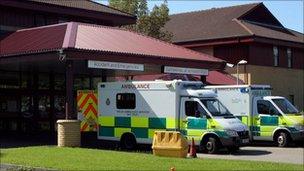NHS Wales: Fewer chronic condition hospital admissions
- Published

Emergency re-admissions for chronic conditions also fell, said the report
There has been a "significant" fall in emergency admissions to Welsh hospitals of patients with chronic conditions, figures suggest.
Research by NHS Wales chief executive David Sissling shows a 12% fall in with regard to heart disease, respiratory conditions and diabetes.
Mr Sissling cited better treatment of the conditions in community settings.
But Diabetes UK Cymru warned of a dwindling number of local specialist nurses and a shortage of dieticians.
Mr Sissling's report for 2011/12, to be published on Tuesday, also shows that emergency re-admissions for chronic conditions fell by almost 23% overall.
The figures are to be published as health boards across Wales prepare to consult on plans to improve their services.
"The NHS has made significant strides in reducing hospital admissions for chronic conditions," said Mr Sissling.
"These reductions illustrate two important developments - the improved treatment of once-fatal diseases through better care - often in community settings - and because of that, less reliance on hospitals for the treatment of these conditions."
Mr Sissling said the figures showed the NHS in Wales was making progress in shifting the balance of care from hospital to community settings.
'Challenges'
He added that changes could be made in the health service in Wales to reflect the improved situation, and called for a greater focus on community-based services alongside specialist centres of excellence.
"In order to meet these challenges, we need to modernise our health services and over the coming months communities across Wales will get a chance to voice their opinions on changes to health services in their areas," he said.
Dai Williams, director of Diabetes UK Cymru, said it was difficult to comment on figures from an as yet unpublished report.
But he added: "The claims in the press release are remarkable if they can be substantiated.
"Even if the number of people being treated for diabetes in hospital is dropping, the key is the quality of care that people receive.
"We know that only 2% of people with diabetes get structured education about their condition, even though such education is recommended by NICE.
"We know that the number of Diabetes Specialist Nurses is falling and there is a shortage of dieticians.
'Core services'
"The last inpatient audit, carried out earlier this year, showed that 29.8% of inpatients were given the wrong medication. We await the report with great interest."
Plaid Cymru said the figures proved its argument that the health service should be rooted in communities in order to deliver the best possible care for patients.
But a spokesperson for the party warned that as local health councils worked with the Welsh government to reconfigure hospital services in Wales, core services should not be taken away.
"Taking services away from hospitals without replacing them elsewhere in the community does not equate to better care, and we have always been clear that this cannot be allowed to happen as services are reconfigured," said a spokesperson.
The Board of Community Health Councils (CHCs) said it would not comment until it had seen the full extent of Mr Sissling's report.
However, a spokesperson said CHCs across Wales would engaged with their respective health boards on their plans for service change over the coming months, and would scrutinise all available evidence and data when evaluating the plans.
- Published23 January 2012
- Published17 November 2011
- Published1 November 2011
- Published26 May 2011